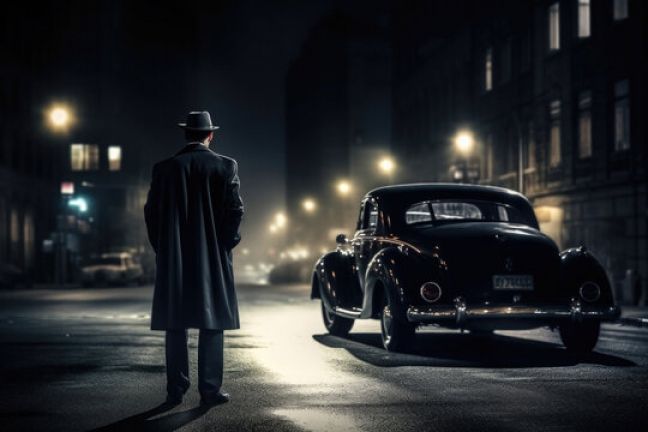Depictions of Private Detectives in Movies and TV Shows
Introduction
In the dimly lit streets of classic film noir or the high-tech surveillance rooms of contemporary crime dramas, depictions of private detectives in movies and TV shows have remained steadfast protagonists in the ever-evolving world of entertainment. These enigmatic figures, draped in trench coats or wielding state-of-the-art gadgets, have long held our fascination, serving as both problem solvers and embodiments of intrigue.
But as we immerse ourselves in the thrilling escapades of these fictional gumshoes, it begs the question: How accurately do these on-screen depictions of private detectives in movies and TV shows reflect the real lives and work of private investigators? “Depictions of Private Detectives in Movies and TV Shows” invites you to embark on a captivating journey through the cinematic and televised realm of private detectives.
Here, we will delve into the shadowy world of common stereotypes, celebrate the iconic characters that have graced our screens, and shed light on the stark contrasts between fiction and reality. Together, we will uncover why these characters continue to enthrall us and how their stories have left an indelible mark on our perception of the private investigative profession.
So, as we step into the shoes of these cinematic sleuths, let’s explore the multifaceted world of depictions of private detectives in movies and TV shows, unraveling the mysteries, misconceptions, and enduring appeal that define this captivating genre.
Common Stereotypes
When it comes to depictions of private detectives in movies and TV shows, certain stereotypes have become deeply ingrained in our collective imagination. These recurring tropes, while often entertaining, can shape our perceptions of real private investigators. In this section, we’ll explore some of the most prevalent stereotypes:
- The Hard-Boiled Detective : Perhaps the most iconic stereotype, this detective is typically portrayed as a rugged, world-weary individual. Often seen wearing a fedora and smoking a cigarette, they have a penchant for sharp one-liners and a gruff exterior that conceals a heart of gold.
- The Femme Fatale : In many classic noir films, a sultry and mysterious woman plays a central role. She may be a client, a love interest, or a villainess, using her wits and charm to manipulate the detective and drive the plot.
- The Brilliant Eccentric : This detective is characterized by their eccentricities and unique quirks. They might possess extraordinary intellect, remarkable deductive skills, or a penchant for unorthodox investigative methods. Sherlock Holmes is a prime example of this stereotype.
- The Bumbling Amateur : On the opposite end of the spectrum, this detective is often portrayed as an amateur or accidental sleuth who stumbles into a mystery. Despite their lack of training, they manage to solve cases through luck or sheer determination.
- The Technological Whiz : In contemporary depictions, especially in TV shows, the private detective often relies on cutting-edge technology and hacking skills. They can access information with a few keystrokes and use surveillance equipment that rivals that of intelligence agencies.
- The Lone Wolf : This stereotype portrays the private detective as a solitary figure who prefers to work alone, eschewing help from law enforcement or partners. Their independence and mistrust of authority are defining traits.
- The Alcoholic or Depressive : Some depictions highlight the darker aspects of a detective’s life, showing them as struggling with alcoholism, depression, or other personal demons. This adds complexity to their character but can also reinforce a negative stereotype.
- The Unconventional Dresser : Private detectives often have distinctive fashion choices. Whether it’s a trench coat, a deerstalker hat, or a unique accessory, their clothing is often a key part of their character.
In this section, we will delve deeper into each of these stereotypes, examining their origins, evolution, and the impact they have on both the audience’s perception of private detectives and the real professionals who work in the field. Through this exploration, we’ll uncover how these stereotypes have shaped the genre and influenced our understanding of the private detective profession.
Impact on the Private Investigation Industry
Media portrayals can have a significant impact on the private investigation industry. These portrayals, often found in movies, television shows, and news stories, can shape public perception, influence potential clients, and affect the way private investigators are viewed by society. Here is a detailed evaluation of the impact of media portrayals on the private investigation industry:
- Image and Perception
:
- Positive Portrayals : When the media portrays private investigators as skilled professionals who solve complex cases, it can enhance the industry’s reputation. Positive portrayals can attract more clients and make potential clients feel confident in hiring a private investigator.
- Negative Stereotypes : However, media can also perpetuate negative stereotypes, such as portraying investigators as unethical, shady, or engaged in illegal activities. These stereotypes can deter potential clients and damage the industry’s credibility.
- Demand for Services
:
- Media-Driven Demand : High-profile cases portrayed in the media can lead to an increased demand for private investigation services. People might turn to private investigators to solve mysteries or provide insight, mirroring what they’ve seen in movies or TV shows.
- Misconceptions : Media portrayals can create unrealistic expectations of what private investigators can achieve. Clients might expect quick and dramatic results, which may not always be possible in real-life investigations.
- Technological Expectations
:
- Advanced Technology : Media often depicts private investigators using cutting-edge technology, which may not reflect the reality of every case. This can lead to the misconception that every investigator has access to state-of-the-art tools and resources.
- Realistic Limitations : In reality, the private investigation industry relies on a combination of technology and traditional investigative techniques. Media can sometimes blur these lines, making it challenging for clients to understand what is achievable.
- Ethical Considerations
:
- Grey Area Depictions : Some media portrayals may showcase private investigators operating in ethically ambiguous situations, such as violating privacy or bending the law to obtain information. This can lead to misconceptions about the ethics of the profession.
- Ethical Challenges : In real life, private investigators must adhere to strict ethical guidelines and legal boundaries. Misrepresentations in the media can make it difficult for investigators to maintain their professionalism and ethical standards.
- Competitive Landscape
:
- Competition and Collaboration : Media portrayals can lead to an increase in individuals interested in becoming private investigators. This can intensify competition within the industry but also foster collaboration and partnerships among professionals.
In conclusion, media portrayals have a dual impact on the private investigation industry. They can boost the industry’s image, generate demand, and inspire interest but can also perpetuate stereotypes, create unrealistic expectations, and present ethical challenges. Private investigators must navigate this complex landscape to maintain their integrity and adapt to evolving client perceptions shaped by the media.
The Appeal of the Genre

Private detective stories continue to captivate audiences for several compelling reasons:
- Mystery and Intrigue : Private detective stories are inherently mysterious and often involve complex, puzzling cases. The allure of solving a mystery and uncovering hidden truths is a timeless human fascination.
- Intellectual Challenge : These stories frequently require critical thinking and deductive reasoning. Audiences enjoy the mental stimulation of trying to solve the case alongside the detective, making them feel engaged and intellectually challenged.
- Character Depth : Well-developed detective characters with unique personalities, quirks, and flaws draw viewers or readers in. Audiences become emotionally invested in their journeys, adding depth to the storytelling.
- Morally Ambiguous Situations : Many private detective narratives explore moral gray areas. Detectives often operate in the shadowy realms of society, confronting ethical dilemmas. This complexity adds depth to the storytelling and engages the audience’s moral compass.
- Human Complexity : Private detective stories delve into the complexities of human nature. They explore motives, desires, and the various facets of the human psyche, making the characters and their actions relatable.
- Cultural Context : These stories often reflect the cultural and societal norms of their time. They can serve as historical snapshots, offering insights into different eras and the challenges people faced.
- Empowerment : The detective figure, whether a professional or amateur, often represents the triumph of justice and individual agency. Audiences are drawn to stories where individuals take matters into their own hands and right wrongs.
- Variety of Settings : Private detective stories can take place in various settings, from gritty urban environments to picturesque countryside locations, offering a diverse range of atmospheres and backdrops.
- Social Commentary : Many detective stories tackle important social issues, such as corruption, inequality, and power dynamics. They serve as a vehicle for social commentary and can prompt critical reflection.
- Escapism : Detective stories offer an escape from the mundane realities of life. They transport audiences into intriguing, suspenseful worlds where they can temporarily forget their own troubles.
- Timeless Appeal : The enduring popularity of classic detective fiction by authors like Arthur Conan Doyle, Agatha Christie, and Raymond Chandler illustrates the timeless appeal of these stories. They continue to find new audiences generation after generation.
- Adaptability : Private detective stories are adaptable to various media, including novels, films, TV shows, video games, and podcasts. This adaptability ensures that the genre remains relevant and accessible to a wide range of audiences.
In summary, private detective stories captivate audiences because they tap into fundamental human curiosities, challenge our intellect, offer rich character development, and explore complex themes. Their enduring appeal lies in their ability to combine mystery, morality, and human psychology within diverse and engaging narratives.
Analyze the enduring popularity of the genre in both classic and modern contexts
The enduring popularity of the detective genre in both classic and modern contexts can be attributed to a combination of timeless elements and adaptations that keep it relevant to changing societal, technological, and cultural landscapes.
Classic Context:
- Mystery and Intrigue : Classic detective stories, such as Arthur Conan Doyle’s Sherlock Holmes or Agatha Christie’s Hercule Poirot, were pioneers in crafting intricate mysteries that captivated readers with their clever plot twists and puzzles.
- Character Icons : Iconic detective characters like Holmes and Poirot became cultural symbols. They are remembered not only for their deductive skills but also for their unique personalities, quirks, and memorable catchphrases.
- Era-specific Appeal : Classic detective stories often reflected the social norms, values, and anxieties of their respective eras. For example, Agatha Christie’s novels often explored societal issues of her time, providing readers with both entertainment and a window into the past.
- Literary Craftsmanship : Classic detective authors were masterful storytellers. They crafted narratives with precision, maintaining suspense and keeping readers engaged until the final reveal. This literary craftsmanship continues to be celebrated.
Modern Context:
- Diversity and Representation : Modern detective stories have embraced diversity, featuring detectives from various backgrounds and identities. This inclusivity reflects contemporary values and broadens the genre’s appeal to a more diverse audience.
- Technological Advancements : In the digital age, technology plays a significant role in modern detective narratives. Cybercrime, hacking, and forensic science are integrated into plots, making the stories relevant and relatable to the tech-savvy audience.
- Complex Characters : Modern detective protagonists are often more psychologically complex, dealing with personal demons, traumas, and ethical dilemmas. This depth of character adds layers to the storytelling and engages viewers or readers on an emotional level.
- Genre Fusion : The detective genre has evolved to incorporate elements of other genres, such as noir, thriller, and supernatural. These crossovers attract a wider range of audiences and offer fresh perspectives on the traditional detective narrative.
- Social Commentary : Many modern detective stories tackle contemporary social issues, providing a platform for discussing topics like corruption, surveillance, and social justice. They serve as a mirror to society, prompting critical reflection.
- Continued Adaptations : Classic detective stories have been adapted into modern media, including film and television series. These adaptations introduce these timeless characters and stories to new generations.
- Transmedia Storytelling : The detective genre has expanded into various forms of media, including podcasts, video games, and interactive experiences. This adaptability ensures its relevance in the digital age.
- Global Appeal : Modern detective stories often feature global settings, characters, and cases, making them accessible and appealing to an international audience.
In conclusion, the enduring popularity of the detective genre in both classic and modern contexts can be attributed to its ability to adapt to changing times while retaining core elements like mystery, complex characters, and the exploration of human nature. These stories continue to captivate audiences by blending tradition with innovation, making them a versatile and beloved genre.
Critiques and Controversies
The portrayal of private detectives in media has not been without criticism and controversy. Several issues and concerns have emerged over the years:
- Ethical Concerns
:
- Private investigators in media are often depicted engaging in ethically questionable or illegal activities to solve cases. This can perpetuate misconceptions about the profession and contribute to a negative public image.
- Glamorization of Surveillance
:
- Some portrayals glamorize the invasive surveillance methods employed by private detectives. This can lead to concerns about privacy invasion and the normalization of surveillance culture.
- Stereotyping
:
- Media often resorts to stereotypes when portraying private investigators, such as the hard-drinking, chain-smoking, morally ambiguous detective. These stereotypes can oversimplify the complexity of real-life investigators.
- Inaccuracy and Exaggeration
:
- Media often exaggerates the capabilities and resources of private investigators, making it appear as though they have access to high-tech gadgets and methods that are not representative of the industry as a whole.
- Gender Bias
:
- Historically, private detective stories have been criticized for gender bias, often portraying female investigators in stereotypical or marginalized roles. However, there have been positive changes in recent years with more diverse and empowered female characters.
- Racial and Cultural Insensitivity
:
- Media portrayals have sometimes been criticized for perpetuating racial and cultural stereotypes, particularly when it comes to depicting investigators from different backgrounds or cultures.
- Depiction of Violence
:
- Some detective narratives may glorify or sensationalize violence, particularly in crime dramas. This can raise concerns about the desensitization of viewers to real-world violence.
- Romanticizing Addiction
:
- Some classic detective characters are depicted as heavy drinkers or substance abusers, which can romanticize addictive behavior and downplay the serious consequences of addiction.
- Realism vs. Fiction
:
- There is often a disconnect between real-life private investigation work and its portrayal in media. Viewers and readers may develop unrealistic expectations about the speed, success rate, and methods employed by private investigators.
- Impact on the Profession
:
- Misrepresentations in media can affect the real-world private investigation profession. Potential clients may have misguided expectations, and investigators may encounter skepticism or suspicion based on fictional portrayals.
It’s important to note that not all media portrayals of private detectives are problematic, and there have been efforts to present a more accurate and balanced view of the profession. Additionally, media can serve as a platform for discussing ethical dilemmas and societal issues related to investigation work. However, it remains essential for both creators and consumers of media to be aware of these criticisms and controversies and to approach portrayals of private detectives with a critical and discerning eye.
Conclusion
In conclusion, the contrast between Hollywood’s portrayal of private detectives in movies and TV shows and the reality of the profession is both striking and multifaceted. While these fictional depictions often capture the audience’s imagination with intriguing mysteries, charismatic characters, and suspenseful plots, they frequently diverge from the realities of private investigation work.
Hollywood tends to romanticize and dramatize the profession, emphasizing certain aspects of entertainment value. This can lead to misperceptions and misunderstandings about what private investigators truly do. In reality, private detectives engage in a diverse range of tasks, from background checks and surveillance to fraud investigations and legal support. Their work is often meticulous, time-consuming, and governed by ethical guidelines and legal constraints.
Despite the gaps between fiction and reality, these portrayals serve as a testament to the enduring fascination with private detective stories. They continue to captivate audiences by tapping into our innate curiosity, love for solving mysteries, and appreciation for complex characters. Moreover, these portrayals adapt to changing times, reflecting contemporary societal, technological, and cultural trends, which ensures the genre’s relevance in the modern media landscape.
While it is essential to approach Hollywood’s depictions of private detectives with a critical eye and an awareness of their exaggerations and dramatizations, it’s equally important to recognize the enduring appeal of these narratives. They provide not only entertainment but also opportunities for discussions about ethics, human nature, and societal issues. As the genre continues to evolve, it remains a powerful medium for storytelling, inviting audiences to explore the intriguing world of private investigation, even if it’s sometimes more fiction than fact.

Browse our website
Contact Information
Phone: (415)-926-3440
Email: foglightpi@gmail.com
Business Hours: 24/7
License #28391















